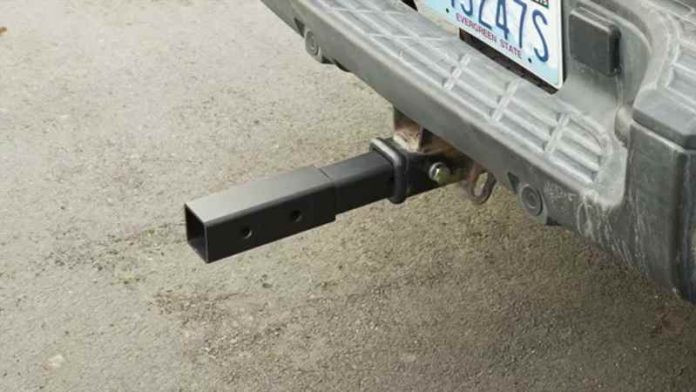Table of Contents
Understanding Trailer Hitch Extensions and Adapters
Have you ever found yourself scratching your head, trying to figure out how to make your RV setup work with a trailer hitches that just doesn’t seem compatible? Enter the world of RV trailer hitches extensions and adapters. These little heroes of the road are crucial for ensuring that your towing setup is not only functional but also safe.
Definition and Purpose
The purpose of RV trailer hitch extensions and adapters is straightforward: they serve as the connecting bridge between your recreational vehicle and what you intend to tow. Whether it’s a boat, a trailer full of camping supplies, or even another vehicle, these tools ensure that the connection is secure and reliable. Trailer hitch extensions provide additional clearance from the rear of your vehicle, which can be particularly useful if your RV has a rear-mounted accessory like a bike rack or cargo carrier. Adapters, on the other hand, allow for different types or sizes of trailer hitch extensions to connect, ensuring compatibility even when the towing vehicle and trailer have different connection points.
Types and Variations
The market offers a variety of trailer hitch extensions and adapters to suit every need. The most common types include:
- Ball mount extensions: These allow for an extended reach from the towing vehicle to the trailer, providing extra space for maneuverability.
- Receiver extensions: Similar to ball mounts, these extend the receiver tube outward, giving additional clearance.
- Electrical adapters: Different trailers may require different electrical connectors. Electrical adapters bridge this gap, ensuring lights and brakes function correctly across dissimilar systems.
These variations cater to the diverse configurations found in RV setups and address the myriad of challenges that come with towing different types of loads and trailers. The key to their effectiveness lies in their ability to adapt to various scenarios, allowing for a customized towing experience.
As we transition into discussing the benefits and considerations of using these trailer hitch extensions and adapters, it’s important to keep in mind that while they add versatility to your setup, they also introduce additional factors that must be carefully managed to maintain safety and efficiency on the road. Remember, the right choice of trailer hitch extension or adapter is not only about convenience; it’s about ensuring peace of mind during your travels.
Benefits and Considerations
Enhanced Versatility
Imagine being able to tailor your towing setup to meet the specific demands of each journey you embark on. This is precisely the flexibility that trailer hitch extensions and adapters offer. By using these handy tools, you can adjust the length between your RV and trailer, accommodating various sizes and types of loads. Whether you’re hauling a simple utility trailer or a larger boat trailer, the right adapter can make all the difference. You’re not just limited to a one-size-fits-all solution; with these extensions and adapters, you have the ability to modify your towing arrangement to best suit the cargo you’re carrying.
Think about the times you’ve seen an RV struggling to maneuver a tight corner or navigate through traffic. Extensions and adapters provide that extra bit of room needed to improve turning radius and reduce the risk of the trailer bumping into the RV during sharp turns. Moreover, some situations call for additional clearance—for instance, when using a bike rack or a cargo carrier. In such cases, the extended reach that these accessories provide ensures everything fits together seamlessly, keeping your travels hassle-free and enjoyable.
Safety and Efficiency
While versatility is a major benefit of using trailer hitch extensions and adapters, it’s important to consider safety and efficiency as well. When choosing an extension or adapter, it’s crucial to ensure that it is compatible with your towing vehicle and trailer. Using the wrong type or size can lead to unstable towing, increased risk of accidents, and potential damage to your equipment.
Additionally, adding an extension or adapter can impact the weight distribution between your towing vehicle and trailer. It’s essential to carefully calculate and adjust the weight distribution to maintain stability and control while on the road. This may require the use of weight distribution systems or sway control devices.
Furthermore, when using electrical adapters, it’s crucial to properly connect and secure the wiring to ensure reliable communication between your towing vehicle and trailer. Faulty connections can result in malfunctioning lights, brakes, or other electrical components, compromising safety on the road.
Maintenance and Durability
Another consideration when using trailer hitch extensions and adapters is maintenance and durability. These accessories are exposed to various elements, such as dirt, moisture, and road debris, which can affect their performance over time. Regular inspection, cleaning, and lubrication are necessary to ensure smooth operation and prevent rust or corrosion.
It’s also important to choose high-quality extensions and adapters that are designed to withstand the demands of towing. Look for reputable brands and materials that are durable and resistant to wear and tear. Investing in a reliable product will not only provide peace of mind but also save you from costly repairs or replacements in the long run.
In conclusion, trailer hitch extensions and adapters offer enhanced versatility, allowing you to customize your towing setup for different loads and trailers. However, it’s essential to prioritize safety, efficiency, and durability when choosing and using these accessories. Proper installation, weight distribution, and maintenance are key to ensuring a safe and enjoyable towing experience.
Weight Distribution and Safety
While versatility is a significant advantage, safety remains paramount. Effective weight distribution is critical when towing, as it impacts vehicle stability, steering, and braking. Trailer hitch extensions and adapters play a vital role in achieving this balance. However, it’s essential to understand that extending the hitches can alter the towing dynamics. Therefore, it’s crucial to ensure that any extension used does not push the weight too far back, which could lead to trailer sway or reduced steering control of the towing vehicle.
When selecting a trailer hitch extensions or adapters, always check the weight rating to match your RV and trailer’s requirements. It’s worth noting that every piece added to your towing setup has its own weight limit, which must not be exceeded to maintain safe towing practices. A common mistake is to only consider the towing capacity of the vehicle, but overlooking the ratings of the hitches, extension, and adapter can lead to dangerous situations, especially under heavy loads or during emergency maneuvers. Additionally, using a trailer hitch extension typically reduces the overall towing capacity of the hitches assembly—another reason why careful consideration is needed to ensure a safe towing experience.
To mitigate risks, some extensions come equipped with integrated weight distribution systems. These are designed to spread the load more evenly across the tow vehicle and trailer, enhancing stability and control. When used correctly, they can significantly improve the safety and handling characteristics of your towing setup, giving you peace of mind as you traverse various terrains.
In sum, while trailer hitch extensions and adapters increase versatility, they also introduce new factors that must be carefully considered to maintain safety. Always adhere to the manufacturer’s guidelines and consult with professionals if you are unsure about the correct setup for your needs. By doing so, you’ll ensure that your adventures on the open road are both flexible and secure.
Selecting the Right Trailer Hitch Extensions and Adapters
Now that you’re familiar with the benefits and safety considerations of RV hitch extension and adapters, it’s time to delve into selecting the right one for your needs. The process can be compared to finding a key for a lock – not just any key will do; it must be the correct one for a perfect fit. This section will guide you through the compatibility factors, installation, and usage to ensure you make an informed decision.
Compatibility Factors
When choosing an extension or adapter, think of it as pairing wine with a meal – the right combination enhances the experience. The primary concern is compatibility. Your vehicle and trailer must coordinate like a well-rehearsed dance duo. Check the owner’s manuals for both to determine the type of hitch receiver and connection required.
Weight ratings are the next critical factor. They are like the maximum weight a bridge can hold; surpassing it could lead to disaster. Ensure the extension or adapter can handle the combined weight of your trailer and its cargo. Lastly, length requirements must be considered. Similar to the length of a boat’s anchor chain, too short or too long can cause problems. The extension or adapter should offer enough clearance without compromising stability or maneuverability.
- Vehicle and Trailer Compatibility: Match the extension or adapter to your vehicle’s hitch class and trailer’s coupler.
- Weight Ratings: Verify that the Gross Trailer Weight (GTW) and Tongue Weight (TW) ratings of the extension or adapter exceed your towing needs.
- Length Requirements: Choose an extension or adapter of appropriate length to ensure safe turning and proper weight distribution.
Installation and Usage
The installation of a trailer hitch extensions or adapter is much like assembling a model kit – careful attention to detail ensures a successful outcome. Begin by securing the extension or adapter to your vehicle’s hitch, following the manufacturer’s instructions closely. If required, attach additional equipment such as stabilizers or anti-rattle devices, which act like the steadying handrails on a staircase. Once installed, double-check all connections, just as a pilot would before takeoff. When using the setup, be mindful of altered driving dynamics. The extension can change how your vehicle handles, similar to how a boat behaves differently when towing a water skier. Adjust your driving accordingly and monitor for any signs of wear or unusual movement during use.
- Follow Manufacturer Instructions: Carefully read and adhere to the guidelines provided by the extension or adapter manufacturer.
- Additional Equipment: Install any necessary supporting equipment to maintain stability and reduce noise or vibration.
- Driving Dynamics: Be aware of changes in vehicle handling and adjust your driving to compensate for the extended hitch setup.
In the realm of RV travel, ensuring a safe and enjoyable journey is paramount. By paying close attention to compatibility factors and meticulous installation, your towing adventures can be both smooth and secure. With the right extension or adapter, like the perfect accessory to an outfit, your RV setup will be complete, functional, and ready for the road ahead.
Maintenance and Safety Tips
Embarking on an RV adventure brings the promise of freedom and excitement, but it also bears the responsibility of ensuring a safe journey. This is where the significance of regular inspection comes into play. Just as you would routinely check your vehicle’s oil or tire pressure, trailer hitch extensions and adapters require the same level of attention.
Regular Inspection
Why should regular inspection be at the top of your maintenance checklist? Well, think of these components as the unsung heroes that connect your RV to your adventures. They bear the brunt of stress and strain during travel. Checking for signs of wear and tear, such as rust, corrosion, or structural damage, is crucial. It’s not just about looking over the equipment; it’s about being proactive in preventing potential failures that could lead to accidents on the road. Manufacturers often provide guidelines on how frequently to inspect your towing gear – make sure to follow them as part of your routine.
Proper Storage
When it comes to maintaining the longevity and functionality of your trailer hitch extensions and adapters, proper storage cannot be overstated. Exposure to harsh weather conditions can expedite the deterioration of metals and other materials. Ideally, when not in use, these towing essentials should be kept in a dry, clean, and covered space to ward off the elements. This simple step can prevent unnecessary wear and can keep your equipment ready at a moment’s notice. Additionally, consider applying a protective coating or lubricant to metal parts to fend off rust and ensure smooth operation.
As you prepare for a getaway or a cross-country tour, remember that the integrity of your trailer hitch extensions and adapters is paramount to a safe trip. By dedicating time to regular inspections and proper storage, you’re not just preserving your equipment; you’re safeguarding your travel plans. Ensure each inspection and maintenance session is thorough, as this vigilance is the key to uninterrupted journeys and cherished memories.
Pros and Cons of Using Trailer Hitch E xtensions and Adapters
Pros
- Increased flexibility and versatility in towing setups.
- Ability to accommodate different sizes and types of loads.
- Improved turning radius and maneuverability.
- Additional clearance for rear-mounted accessories.
- Enhanced weight distribution and stability with the use of integrated weight distribution systems.
Cons
- Altered towing dynamics that may affect vehicle handling.
- Potential for reduced towing capacity.
- Requires careful consideration and adherence to weight ratings.
- Introduces additional factors that must be managed for safety.
- Proper installation and regular inspection are crucial for safe usage.
By understanding the pros and cons of using RV trailer hitch extensions and adapters, you can make an informed decision about whether they are suitable for your towing needs. It is important to weigh the benefits of increased versatility against the potential challenges and ensure that you follow proper installation and safety guidelines.
Common Mistakes to Avoid
When using RV extensions and adapters, it’s important to be aware of common mistakes that can compromise safety and efficiency. By avoiding these pitfalls, you can ensure a smooth towing experience. Here are some common mistakes to avoid:
- Overloading: One of the most common mistakes is exceeding the weight capacity of the hitches extension or adapter. Always check the weight ratings and make sure they match the requirements of your towing setup.
- Improper installation: Incorrectly installing the hitches extension or adapter can lead to instability and compromised towing dynamics. Follow the manufacturer’s instructions carefully and double-check all connections.
- Neglecting maintenance: Regular inspection and maintenance are crucial to identify any signs of wear and tear, rust, or structural damage. Neglecting maintenance can increase the risk of equipment failure during towing.
- Ignoring compatibility: Using an incompatible hitches extension or adapter can lead to unsafe towing conditions. Make sure to match the extension or adapter to your vehicle’s hitch class and trailer’s coupler.
- Neglecting weight distribution: Proper weight distribution is essential for safe towing. Be mindful of how the trailer hitch extension or adapter may affect weight distribution and adjust accordingly.
By being aware of these common mistakes and taking the necessary precautions, you can ensure a safe and enjoyable towing experience with RV extensions and adapters.
Conclusion and Recommendations
Wrapping up our comprehensive journey through the world of RV trailer hitch extensions and adapters, we’ve covered a wide spectrum of topics to ensure you’re well-equipped for your towing needs. Now, let’s briefly revisit the crucial points that will keep you towing smoothly and safely.
1. Choose the right trailer hitch extension or adapter for your specific towing needs, considering factors such as weight capacity and compatibility with your RV and trailer.
2. Follow manufacturer guidelines for installation and usage to ensure proper functionality and safety.
3. Regularly inspect your trailer hitch extensions and adapters for signs of wear and tear, rust, corrosion, or structural damage.
4. Store your towing equipment in a dry, clean, and covered space when not in use to protect against harsh weather conditions.
5. Consider applying a protective coating or lubricant to metal parts to prevent rust and ensure smooth operation.
6. Dedicate time to thorough inspections and maintenance sessions to ensure the integrity of your towing gear.
7. By following these tips, you’re not only preserving your equipment but also safeguarding your travel plans and creating cherished memories on the road.
with your RV. Remember, safety should always be your top priority when towing, so take the time to educate yourself on proper towing practices and stay vigilant while on the road.
Additionally, it’s always a good idea to consult with professionals or experienced RV owners for advice and guidance. They can provide valuable insights and help you avoid common mistakes that could potentially put you and others at risk.
Lastly, don’t forget to enjoy the journey! Towing an RV allows you the freedom to explore new places and create unforgettable memories. So, take your time, stay safe, and make the most of your RV towing experience.
Remember, safety should always be your top priority when it comes to towing. So, take the necessary steps to maintain and care for your trailer hitch extensions and adapters, and enjoy your adventures worry-free.
















